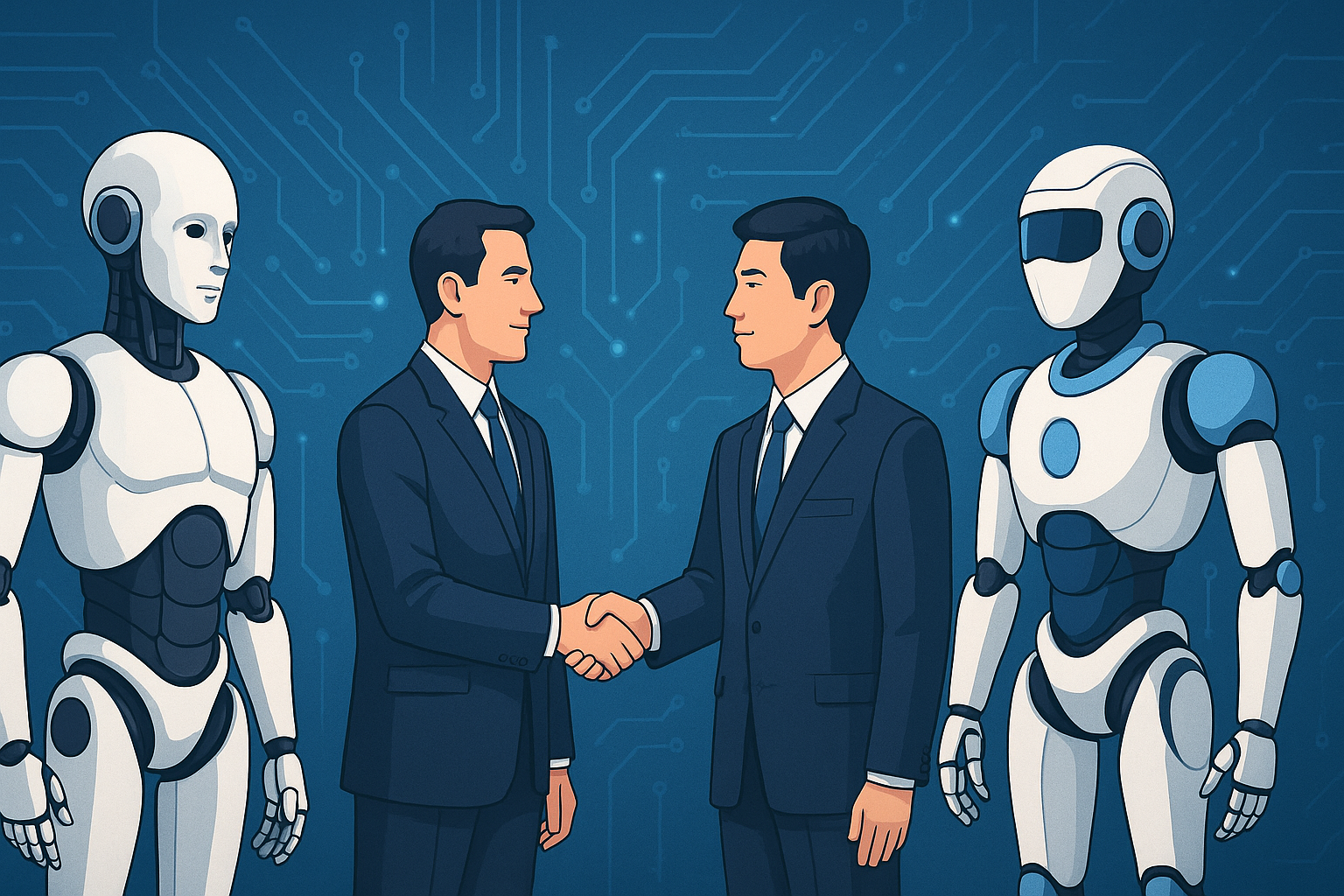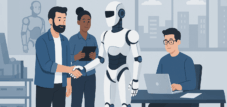
Huawei and Ubtech: Strategic alliance for the development of humanoid robots for industry and household - Image: Xpert.digital
Future technologies from China: How Huawei and Ubtech transform the robotics
The technology -giant Huawei and Ubtech have recently announced a pioneering partnership that aims to develop humanoid robots for both industrial and domestic applications. This cooperation marks a significant step in China's efforts to take a leading position in the global market for robot technology and could fundamentally change the way we interact with technology.
Suitable for:
- Currently the largest humanoid robotics study by Xpert.digital-Marktboom ahead: from robot prototypes to practice
The strategic partnership: basics and objectives
The two companies based in Shenzhen have signed a cooperation agreement that aims to accelerate the transition from humanoid robots from laboratory innovations to large -scale use in industrial, domestic and other scenarios ”. This alliance combines the complementary strengths of both companies: Huawei introduces its advanced AI and cloud technologies, while Ubtech contributes its expertise in the development of humanoid and smart service robots.
As part of the agreement, companies plan to create intelligent factories with humanoid robots and to develop both two -legged and wheels -equipped service robots for household use. A central element of the partnership is the establishment of an innovation center that focuses on “embodied intelligence” (Embodied Intelligence) - an advanced form of artificial intelligence that anchor cognitive processes in a physical body.
Huawei will bring in his self-developed Ascend and Kunpeng Ki processors, its cloud computing technologies and large AI models in the partnership, together with his extensive experience in research, development and supply chains. This technological basis is intended to enable humanoid robots to develop, which are not only remotely controlled, but can make decisions independently.
Technological foundations: from 5G-A to Embodied Ai
An essential aspect of the development of humanoid robots is the integration of advanced connectivity technologies. Huawei already presented the world's first humanoid robot, which was developed worldwide with 5G-ADVanced), which was developed in collaboration with China Mobile and Leju Robot at the Mobile World Congress 2025. Due to wider range, extremely low latency times and more intelligent network architecture, this technology offers a solid technical basis for the diverse application scenarios of humanoid robots.
The 5G-A technology enables humanoid robots, precise location tracking in large-scale environments to achieve without additional equipment, which increases the reliability of the cooperation of several machines. In addition, it supports the real -time control of the robots from a distance and coping with complex tasks.
At the same time, Huawei follows an approach that is referred to as the “Embodied Ai”. Huawei researchers argue that large language models such as Chatgpt cannot fully understand the real world because they do not exist in it. Instead, a AI needs a physical body to understand actions, memory and learning. This approach is followed in the newly founded “Global Embodied Intelligence Innovation Center” by Huawei, which was opened in Shenzhen in November 2024.
The development of humanoid robots: from industry to household
UbTech originally focused on the development of two -legged robots for household applications, but found in the course of the commercialization efforts that numerous technical and logistical challenges were still unsolved. This led to a strategic realignment: the use of robots in factories as the first step.
At the end of 2024, UbTech used the highest number of humanoid robots for training in automotive factories worldwide and closed partnerships with large automobile manufacturers such as Dongfeng Liuzhou Motor, Geely Auto and BYD. UbTech's Walker S series is already used in most production lines of vehicle manufacturers to perform various tasks, and the company has received over 500 orders for these robots from electric vehicle manufacturers.
The long -term timetable from UbTech follows a three -stage strategy: First, the company focuses on the use of humanoid robots in industrial environments, where they already demonstrate their value in factory companies. In the second phase, expansion into commercial service applications is sought, such as hotels, reception areas and airports. The final phase provides for the introduction of humanoid robots for home use, which is considered the most promising long -term application.
The Chinese market for humanoid robots: growth and government initiatives
The market for humanoid robots is growing rapidly in China - a market value of 44 billion euros is expected by 2031. According to the government timetable, China is to begin mass production by humanoid robots in 2025, and as early as 2027, the human -like machines are to be integrated in the real economy.
The Chinese robotics industry is expected to grow this year to $ 5.3 billion ($ 740 million, £ 560 million), which corresponds to a doubling. Ubtech itself plans to produce more than 1,000 humanoid robots this year.
Huawei is massively investing in the Chinese robotic sector to accelerate AI growth in the country. Around 6 out of 11 companies for humanoid robotics strive to build more than 1,000 units this year. In addition, the company has closed partnerships with 16 other companies such as Huayan Robotics and Leju Robot.
Suitable for:
The next era of robotics: progress and visions for home use
Despite the ambitious plans, there are still considerable challenges in developing humanoid robots for home use. A home environment is much more complex than an industrial environment- possibly more complicated ten to hundred times. Every household is different, and the necessary tasks vary greatly. This complexity cannot be solved with preprogrammed processes or predefined work processes.
Experts assume that it will still take 5 to 8 years for the robots to be so fit that they can fully integrate into a household. Humanoid robots can cope better in orderly factories than in the private environment, where they are confronted with a variety of unpredictable situations.
Ubtech follows an approach in the area of consumer robots, which relies on steady progress instead of sudden market entry. The first milestone phase are accompanying robots - robots that are designed to understand user actions and enable meaningful interactions. UbTech is currently developing biomorphic humanoid robots especially for this purpose. As soon as the company has established a strong presence in this area, the next step is to develop full-service robots that can carry out complex household tasks.
Huawei and Ubtech: Pioneers of the humanoid robot technology
The partnership between Huawei and Ubtech marks an important step in the development of humanoid robots, which can be used in both industrial and domestic environments. By combining Huaweis in the areas of AI, cloud computing and chip development with Ubtech's expertise in the field of humanoid robots, companies strive to close the gap between laboratory innovations and practical applications.
While the focus is initially on industrial applications, where the technology has already been tested, the long -term vision aims at integrating humanoid robots into everyday life. In the future, these could not only take on simple household tasks, but also serve as a conversation partner and companion, which could lead to a fundamental change in our interaction with technology.
The development runs in parallel with China's national endeavor to take a leading position in the global AI and robotics industry. With government support and considerable investments, China is on the way to becoming a center for the development and production of humanoid robots, with companies such as Huawei and Ubtech at the head of this technological revolution.
Suitable for:
Your global marketing and business development partner
☑️ Our business language is English or German
☑️ NEW: Correspondence in your national language!
I would be happy to serve you and my team as a personal advisor.
You can contact me by filling out the contact form or simply call me on +49 89 89 674 804 (Munich) . My email address is: wolfenstein ∂ xpert.digital
I'm looking forward to our joint project.

